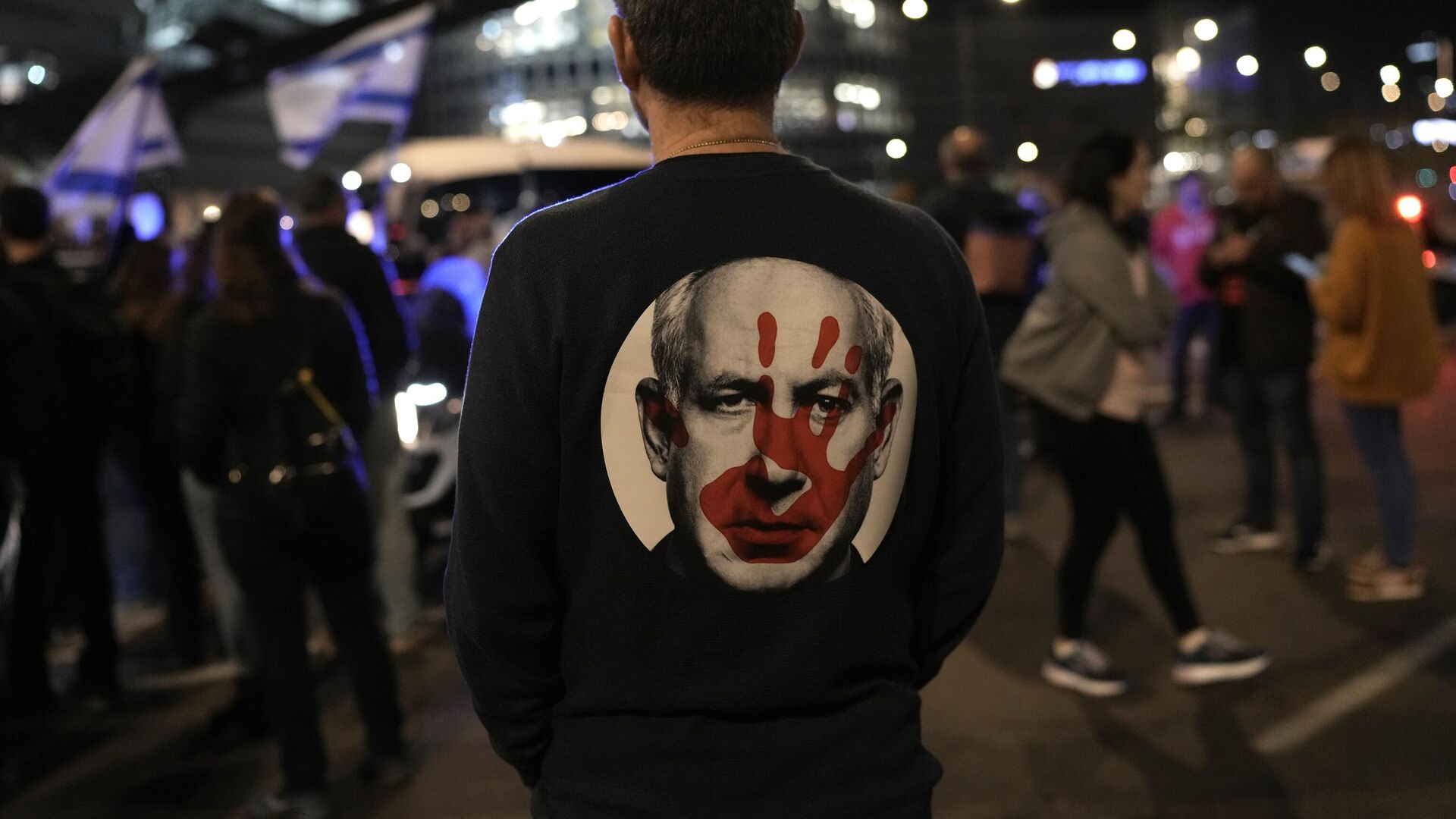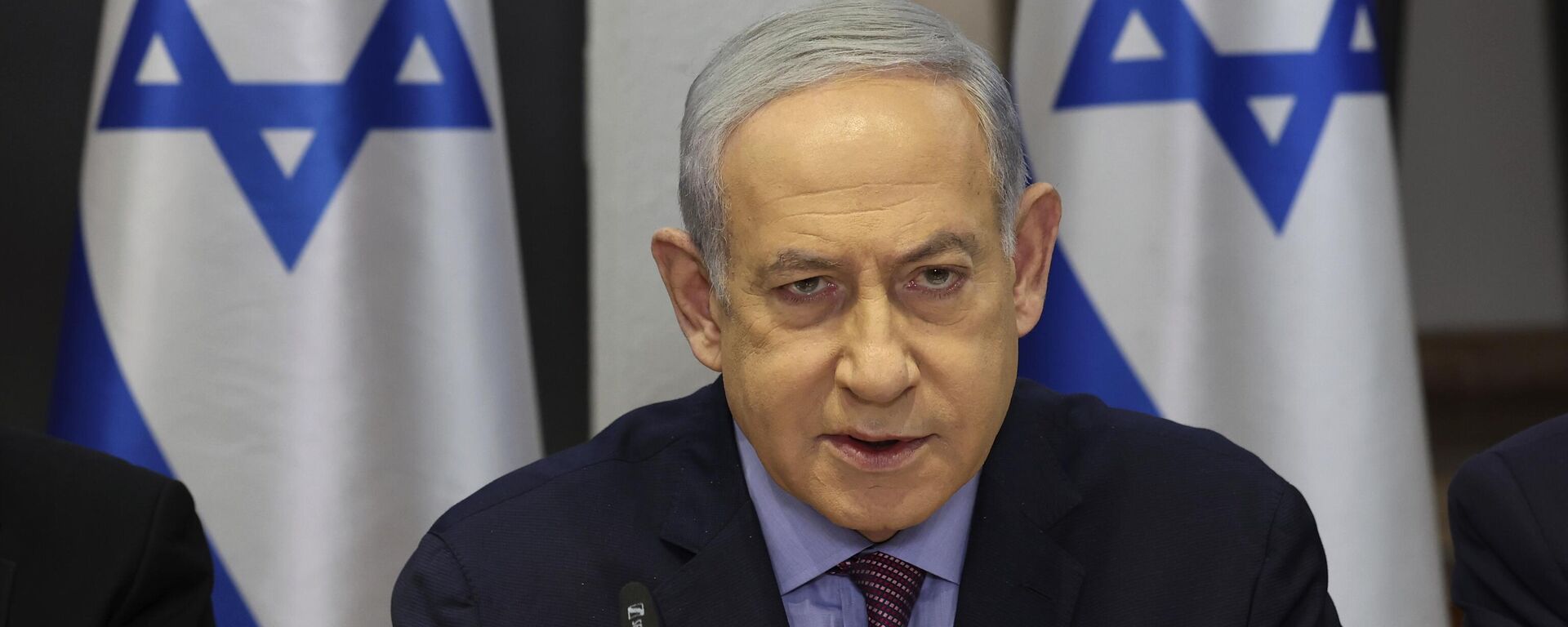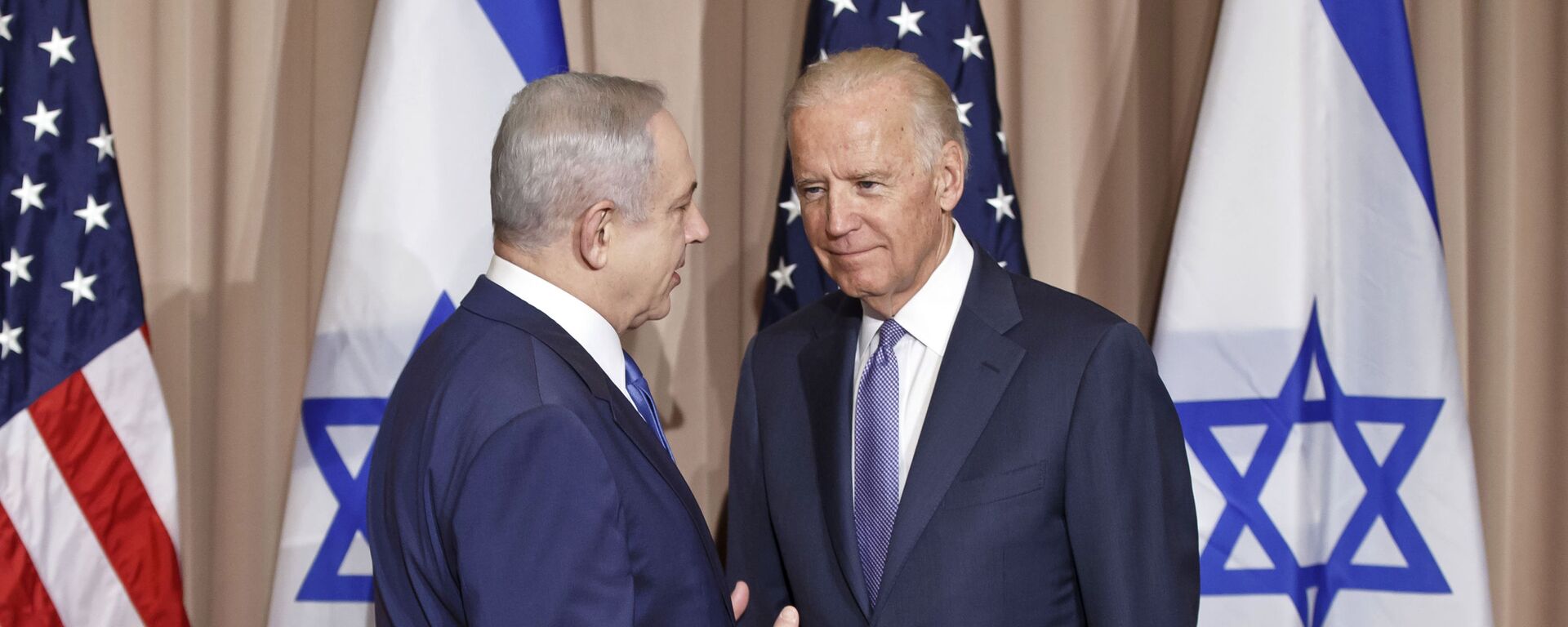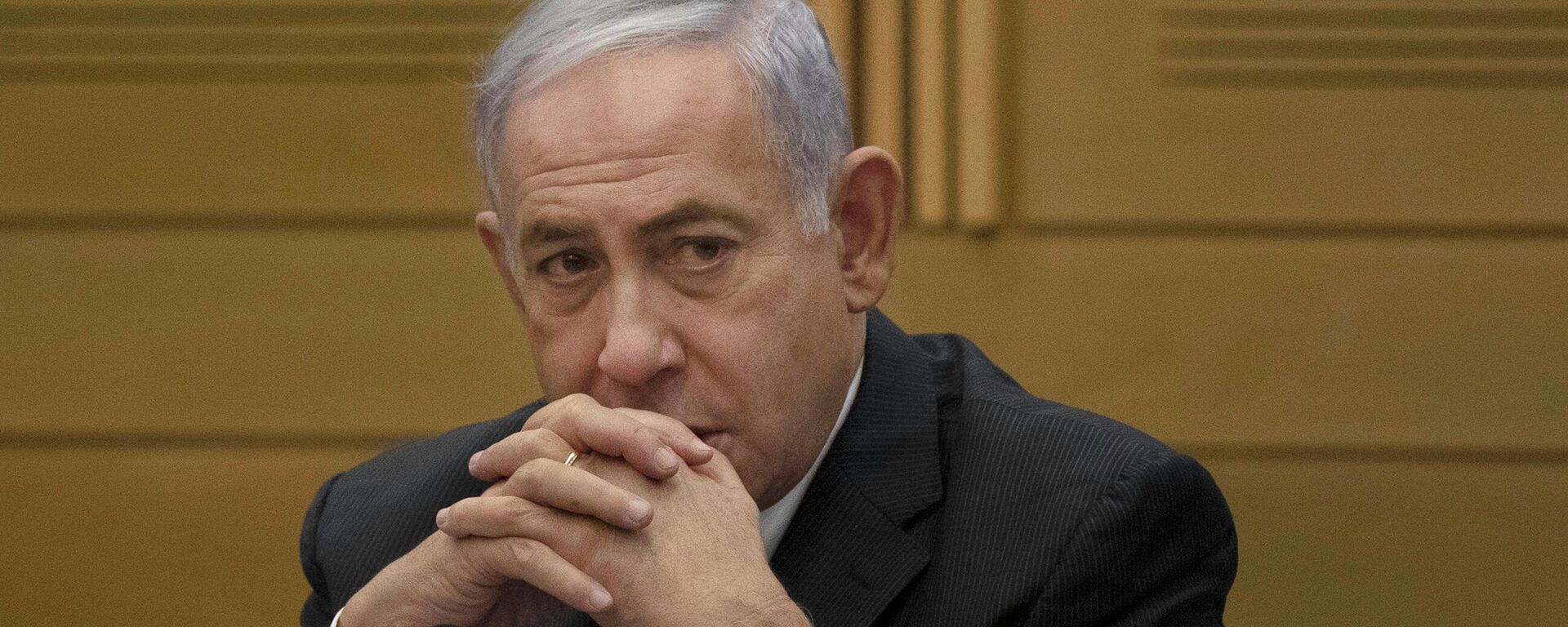https://sputnikglobe.com/20240201/is-netanyahu-main-obstacle-to-gaza-conflict-resolution-and-regional-peace-1116535209.html
Is Netanyahu Main Obstacle to Gaza Conflict Resolution and Regional Peace?
Is Netanyahu Main Obstacle to Gaza Conflict Resolution and Regional Peace?
Sputnik International
Israeli Prime Minister Benjamin Netanyahu's Gaza policy poses a significant threat to the national interests of Israel as well as regional peace, Middle East experts told Sputnik.
2024-02-01T14:30+0000
2024-02-01T14:30+0000
2024-02-01T14:30+0000
benjamin netanyahu
analysis
middle east
palestinians
benny gantz
israel
gaza strip
tel aviv
hamas
palestinian authority
https://cdn1.img.sputnikglobe.com/img/07e8/02/01/1116536981_0:320:3072:2048_1920x0_80_0_0_4151151e350f42106a6e76b4cab8a8c3.jpg
Discontent is reportedly growing within Israeli power and military circles over Benjamin Netanyahu's lack of a Gaza endgame strategy, per The Wall Street Journal. The media outlet suspects that the Israeli prime minister is guided by his own political ambitions in the first place. Meanwhile, Tel Aviv's war on Palestinian militant group Hamas and other entities in the region has already claimed the lives of over 26,000 Palestinians and left over 65,000 injured, according to the Gaza Health Ministry."Undoubtedly, Netanyahu's stance on both domestic and foreign affairs is driven by his political survival motivation, particularly in the face of dwindling public support for his government," Yoram Meital, professor of Middle East Studies at Ben-Gurion University of the Negev, told Sputnik. "Under his leadership, Likud has lost about half of its current Knesset seats. Despite the recent war, Netanyahu's position on the Palestinian cause, especially Gaza, remains unchanged. He consistently undermined the Oslo process from its early stages, allowing Hamas to gain prominence in Palestinian politics to weaken Fatah and the Palestinian Authority. His political alliance with the Israeli right is rooted in this approach toward the Palestinian issue."Back in 1993, the Oslo agreements laid the groundwork for a two-state solution of the Palestinian-Israeli dispute. The accords particularly facilitated the creation of the Palestinian Authority (PA) to govern the West Bank and Gaza Strip. The document, titled "Declaration of Principles on Interim Self-Government Arrangements," was inked on September 13, 1993 by then-Israeli Prime Minister Yitzhak Rabin and then-Palestine Liberation Organization (PLO) Negotiator Mahmoud Abbas.However, in the subsequent years the PA lost its grip in the Gaza Strip, being outpaced by Hamas, which won the local elections in 2006 and removed all pro-PA Fatah officials in 2007. Netanyahu is believed to have fanned enmity between the two in order to hinder Palestinian unification and the eventual formation of a self-sufficient Palestinian state, as Pulitzer Prize-winning journalist Seymour Hersh wrote last October, citing Israeli insiders.In the wake of Hamas' surprise October 7 attack on Israeli settlements, Netanyahu came up with a three-step "solution" for Gaza, claiming that before any peaceful settlement between the Israelis and Palestinians is achieved, "Hamas must be destroyed, Gaza must be demilitarized, and Palestinian society must be de-radicalized." Still, Tel Aviv has not announced any particular timeframe for achieving these objectives, while the Israel Defense Forces (IDF) have continued to bomb the strip into the Stone Age."I may say that Netanyahu does not lack a strategy for Gaza," Dr. Hasan Selim Ozertem, Ankara-based security and political analyst, told Sputnik. "His main strategy is to extend the conflict as much as possible for his political career. It is known that even before October 7, Netanyahu's political popularity was shrinking due to his policies in domestic levels in Israel. So we may say that after the attacks of Hamas militants against Israel, his popularity declined sharply. So any democratic elections would mean for Netanyahu that he would lose some points and probably his authority and premiership in Israeli politics. So he wants to extend the elections and he wants to extend the conflict as much as possible."Who Could Govern Gaza After Conflict Ends?It is still unclear who will rule the troubled Gaza Strip after hostilities are over. The Biden administration and its allies are advocating for installing a renewed PA administration in the enclave. Netanyahu and his allies openly oppose this decision, insisting that the PA cannot be trusted and are considering a temporary Israel military occupation of the post-war strip. Neither the US nor Arab countries support the Israeli prime minister's grand design."I recommend distinguishing between aspirations and reality," Meital stressed. "Ideally, a Palestinian leadership should emerge through a broad consensus. However, in practice, a rivalry has intensified between the Palestinian Authority, controlled by the PLO, and groups like Hamas and other smaller organizations. This existing discord contrasts with the desired national unity. The recent war in Gaza has further exacerbated internal struggles, failing to alleviate disparities among Palestinians."According to the professor, the internal Palestinian division poses a threat to the national struggle, jeopardizing the chances of achieving a political settlement."In the current situation, central Arab countries such as Egypt, Saudi Arabia, and Qatar could potentially play a constructive role in addressing these challenges," he believes.For his part, Ozertem insists that it should certainly be the Palestinian people who decide who should govern them.West Seems Uninterested in Gaza's Human Rights, Democratic ProcessesThe US and EU seem eager to lecture other nations about human rights and democratic values. However, when it comes to Gaza, neither the issue of the civil rights of Palestinians nor a proper democratic process for defining their future has been addressed by Team Biden or European leaders in the course of the conflict.The crux of the matter is that Washington's ardent support for Tel Aviv has prompted frustration and discontent among the Democratic base, including non-whites, young Americans, as well as Arabs and Muslims. This might backfire on Biden's election odds in November.When it comes to Europe, there is a "fragmented position" on the Gaza war, according to the expert."It's hard to talk about a cohesive position regarding Israel's operations in Gaza. Some countries like Spain and Italy, have already started to criticize the ongoing policies by Israel in Gaza," he said.However, no solution has yet been proposed by the West to stop the bloodbath in the Gaza Strip.Why Netanyahu's Gaza War is Bad for IsraelMeanwhile, the WSJ drew attention to the fact that 43 former top officials of Israel’s military and intelligence services wrote a letter to President Isaac Herzog calling for Netanyahu's removal as prime minister. The signatories included several intelligence and security chiefs, who warned the president that Netanyahu "poses a clear and present danger" to Israel over his refusal to define the political goals of the Gaza war."The policies and agenda pursued by Netanyahu and his current coalition pose a significant threat to both national interests and Israeli society," warned Meital. "Their stance serves as a substantial impediment to reaching a viable resolution for the conflict in Gaza and the subsequent restoration of the extensive damage inflicted. In my assessment, Netanyahu and his government are steering Israeli society towards an unprecedented internal conflict, dividing supporters and opponents. Once a long-term ceasefire is achieved in Gaza, the internal strife within Israeli society is likely to escalate, potentially reshaping the landscape of both society and politics in Israel."The US press suggests that the National Unity Party of Benny Gantz would easily defeat Netanyahu’s Likud if elections were held now, citing Israeli national polls. Per the WSJ, Gantz could have been instrumental in solving the Gaza dilemma, as he "has neither called for nor ruled out working with the Palestinian Authority and working toward a Palestinian state.""I remain unconvinced that Benny Gantz has a concrete plan for achieving a lasting settlement in Gaza," Meital said. "Should he assume the role of prime minister in Israel, there is a likelihood that his policy would be based on prioritizing security mechanisms, which would not lead to solving the conflict with the Palestinians. It is crucial to note that post-war, significant changes will be imperative for the security apparatus. Under Gantz's leadership, it is conceivable that Israel might lean towards maintaining the status quo in some form rather than fully committing to a policy aligned with the 'two-state solution' formula."For his part, Ozertem doesn't rule out that a revamp in the Israeli government could somehow open a window of opportunity for solving the ongoing humanitarian crisis and help wrap the conflict up:"Gantz is a member of the War Coalition, War Cabinet in Israel at the moment, but he represents an alternative voice within the Cabinet as well. I may say that a revamp or a reshuffle within the Cabinet and elections may pave the way for a different approach to the ongoing Israel-Gaza or Israel-Hamas conflict. It's hard to call it a change that will bring a definite solution, because we are talking about a decades-long conflict in the region for the time being. But it is still a change that may prepare a basis to talk about a change for the ongoing humanitarian crisis and extended Israeli military operation in Gaza," the expert concluded.
https://sputnikglobe.com/20240128/the-end-of-israel-national-leaders-say-netanyahu-is-existential-threat-to-country-1116444112.html
https://sputnikglobe.com/20240124/biden-not-able-get-the-job-done-on-two-state-solution-1116344202.html
https://sputnikglobe.com/20231012/two-state-solution-or-one-state-agreement-what-are-the-options-in-palestines-path-to-statehood-1114148856.html
https://sputnikglobe.com/20240114/political-survival-now-netanyahus-real-objective-as-gaza-war-enters-day-101-1116165064.html
israel
gaza strip
tel aviv
Sputnik International
feedback@sputniknews.com
+74956456601
MIA „Rosiya Segodnya“
2024
News
en_EN
Sputnik International
feedback@sputniknews.com
+74956456601
MIA „Rosiya Segodnya“
Sputnik International
feedback@sputniknews.com
+74956456601
MIA „Rosiya Segodnya“
gaza war, palestinian national authority, gaza strip, palestine-israel conflict, israel-hamas conflict, benjamin netanyahu, who will rule palestine, who will rule gaza strip, hamas
gaza war, palestinian national authority, gaza strip, palestine-israel conflict, israel-hamas conflict, benjamin netanyahu, who will rule palestine, who will rule gaza strip, hamas
Is Netanyahu Main Obstacle to Gaza Conflict Resolution and Regional Peace?
Israeli Prime Minister Benjamin Netanyahu's Gaza policy poses a significant threat to the national interests of Israel as well as regional peace, Middle East experts told Sputnik.
Discontent is reportedly growing within Israeli power and military circles over Benjamin Netanyahu's lack of a Gaza endgame strategy, per The Wall Street Journal. The media outlet suspects that the Israeli prime minister is guided by his own political ambitions in the first place. Meanwhile, Tel Aviv's war on Palestinian militant group Hamas and other entities in the region has already claimed the lives of over 26,000 Palestinians and left over 65,000 injured, according to the Gaza Health Ministry.
"Undoubtedly, Netanyahu's stance on both domestic and foreign affairs is driven by his political survival motivation, particularly in the face of dwindling public support for his government," Yoram Meital, professor of Middle East Studies at Ben-Gurion University of the Negev, told
Sputnik.
"Under his leadership, Likud has lost about half of its current Knesset seats. Despite the recent war, Netanyahu's position on the Palestinian cause, especially Gaza, remains unchanged. He consistently undermined the Oslo process from its early stages, allowing Hamas to gain prominence in Palestinian politics to weaken Fatah and the Palestinian Authority. His political alliance with the Israeli right is rooted in this approach toward the Palestinian issue." Back in 1993, the Oslo agreements laid the
groundwork for a two-state solution of the Palestinian-Israeli dispute. The accords particularly facilitated the creation of the Palestinian Authority (PA) to govern the West Bank and Gaza Strip. The document, titled "Declaration of Principles on Interim Self-Government Arrangements," was inked on September 13, 1993 by then-Israeli Prime Minister Yitzhak Rabin and then-Palestine Liberation Organization (PLO) Negotiator Mahmoud Abbas.
However, in the subsequent years the PA lost its grip in the Gaza Strip, being outpaced by Hamas, which won the local elections in 2006 and removed all pro-PA Fatah officials in 2007. Netanyahu is believed to have fanned enmity between the two in order to hinder Palestinian unification and the eventual formation of a self-sufficient Palestinian state, as Pulitzer Prize-winning journalist Seymour Hersh wrote last October, citing Israeli insiders.
In the wake of Hamas' surprise October 7 attack on Israeli settlements, Netanyahu came up with a three-step "solution" for Gaza, claiming that before any peaceful settlement between the Israelis and Palestinians is achieved, "Hamas must be destroyed, Gaza must be demilitarized, and Palestinian society must be de-radicalized." Still, Tel Aviv has not announced any particular timeframe for achieving these objectives, while the Israel Defense Forces (IDF) have continued to bomb the strip into the Stone Age.
"I may say that Netanyahu does not lack a strategy for Gaza," Dr. Hasan Selim Ozertem, Ankara-based security and political analyst, told Sputnik. "His main strategy is to extend the conflict as much as possible for his political career. It is known that even before October 7, Netanyahu's political popularity was shrinking due to his policies in domestic levels in Israel. So we may say that after the attacks of Hamas militants against Israel, his popularity declined sharply. So any democratic elections would mean for Netanyahu that he would lose some points and probably his authority and premiership in Israeli politics. So he wants to extend the elections and he wants to extend the conflict as much as possible."
Who Could Govern Gaza After Conflict Ends?
It is still unclear who will rule the troubled Gaza Strip after hostilities are over. The
Biden administration and its allies are advocating for installing a renewed PA administration in the enclave. Netanyahu and his allies openly oppose this decision, insisting that the PA cannot be trusted and are considering a temporary Israel military occupation of the post-war strip. Neither the US nor Arab countries support the Israeli prime minister's grand design.
"I recommend distinguishing between aspirations and reality," Meital stressed. "Ideally, a Palestinian leadership should emerge through a broad consensus. However, in practice, a rivalry has intensified between the Palestinian Authority, controlled by the PLO, and groups like Hamas and other smaller organizations. This existing discord contrasts with the desired national unity. The recent war in Gaza has further exacerbated internal struggles, failing to alleviate disparities among Palestinians."
According to the professor, the internal Palestinian division poses a threat to the national struggle, jeopardizing the chances of achieving a political settlement.
"In the current situation, central Arab countries such as Egypt, Saudi Arabia, and Qatar could potentially play a constructive role in addressing these challenges," he believes.
For his part, Ozertem insists that it should certainly be the Palestinian people who decide who should govern them.
"So if you are talking about the democratic stance over here, the Gazan people should decide about their future," the security analyst pointed out. "After the 2007 elections, when Hamas won, we know that there were no elections in Gaza. So Hamas became the de facto ruler of this area. So at the end of the day, we need political dynamics to start working in Gaza for Gazan people to decide about their future."
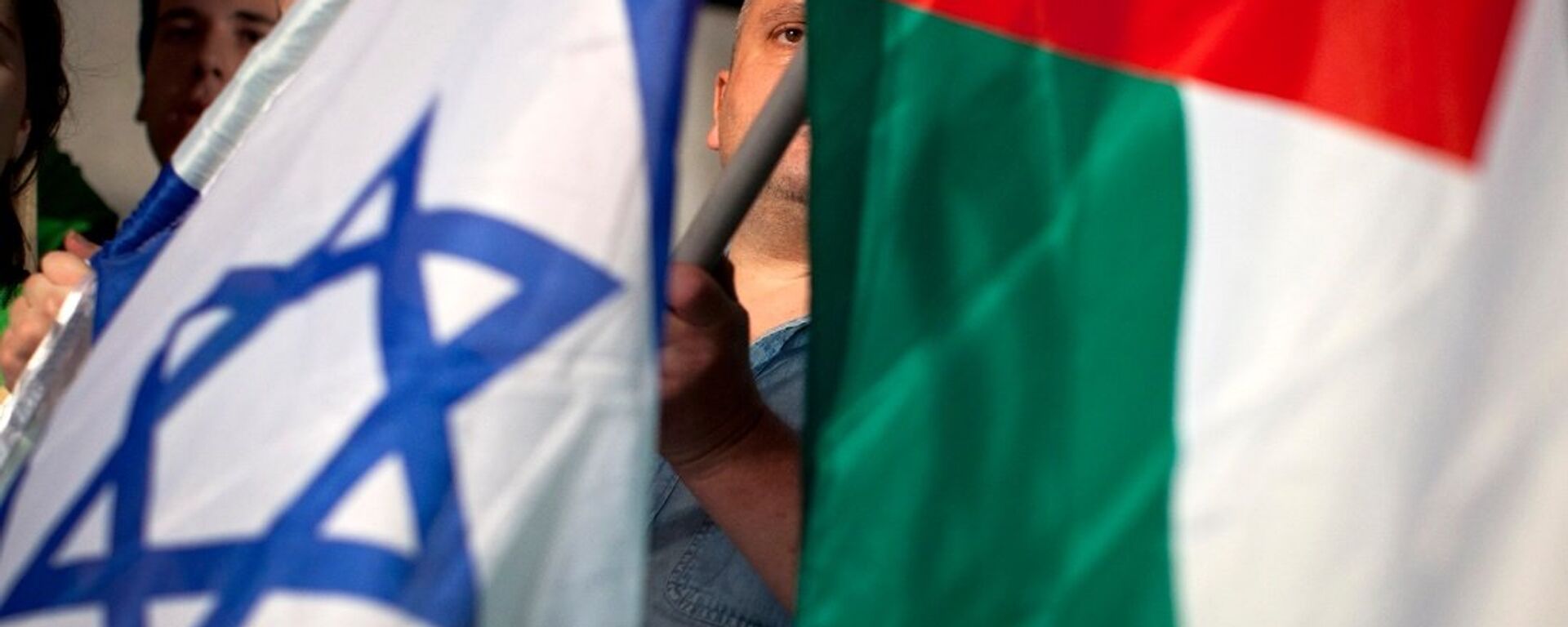
12 October 2023, 18:01 GMT
West Seems Uninterested in Gaza's Human Rights, Democratic Processes
The US and EU seem eager to lecture other nations about human rights and democratic values. However, when it comes to Gaza, neither the issue of the civil rights of Palestinians nor a proper democratic process for defining their future has been addressed by Team Biden or European leaders in the course of the conflict.
"As you know, it's an election year in the US, there will be presidential elections in November. And, probably, the Biden administration did not want to take risks, to bash Israel publicly," Ozertem said, adding that behind closed doors, Team Biden has started pressuring Netanyahu to wrap the conflict up. Axios reported last Friday that Biden had told Netanyahu during a phone conversation that he would not support "a year-long war" in Gaza.
The crux of the matter is that Washington's ardent support for Tel Aviv has prompted frustration and discontent among the Democratic base, including non-whites, young Americans, as well as Arabs and Muslims. This might backfire on Biden's election odds in November.
When it comes to Europe, there is a "fragmented position" on the Gaza war, according to the expert.
"It's hard to talk about a cohesive position regarding Israel's operations in Gaza. Some countries like Spain and Italy, have already started to criticize the ongoing policies by Israel in Gaza," he said.
However, no solution has yet been proposed by the West to stop the bloodbath in the Gaza Strip.
Why Netanyahu's Gaza War is Bad for Israel
Meanwhile, the WSJ drew attention to the fact that 43 former top officials of Israel’s military and intelligence services wrote a letter to President Isaac Herzog
calling for Netanyahu's removal as prime minister. The signatories included several intelligence and security chiefs, who warned the president that Netanyahu "
poses a clear and present danger" to Israel over his refusal to define the political goals of the Gaza war.
"The policies and agenda pursued by Netanyahu and his current coalition pose a significant threat to both national interests and Israeli society," warned Meital. "Their stance serves as a substantial impediment to reaching a viable resolution for the conflict in Gaza and the subsequent restoration of the extensive damage inflicted. In my assessment, Netanyahu and his government are steering Israeli society towards an unprecedented internal conflict, dividing supporters and opponents. Once a long-term ceasefire is achieved in Gaza, the internal strife within Israeli society is likely to escalate, potentially reshaping the landscape of both society and politics in Israel."
The US press suggests that the National Unity Party of Benny Gantz would easily defeat Netanyahu’s Likud if elections were held now, citing Israeli national polls. Per the WSJ, Gantz could have been instrumental in solving the Gaza dilemma, as he "has neither called for nor ruled out working with the Palestinian Authority and working toward a Palestinian state."
"I remain unconvinced that Benny Gantz has a concrete plan for achieving a lasting settlement in Gaza," Meital said. "Should he assume the role of prime minister in Israel, there is a likelihood that his policy would be based on prioritizing security mechanisms, which would not lead to solving the conflict with the Palestinians. It is crucial to note that post-war, significant changes will be imperative for the security apparatus. Under Gantz's leadership, it is conceivable that Israel might lean towards maintaining the status quo in some form rather than fully committing to a policy aligned with the 'two-state solution' formula."
For his part, Ozertem doesn't rule out that a revamp in the Israeli government could somehow open a window of opportunity for solving the ongoing humanitarian crisis and help wrap the conflict up:
"Gantz is a member of the War Coalition, War Cabinet in Israel at the moment, but he represents an alternative voice within the Cabinet as well. I may say that a revamp or a reshuffle within the Cabinet and elections may pave the way for a different approach to the ongoing Israel-Gaza or Israel-Hamas conflict. It's hard to call it a change that will bring a definite solution, because we are talking about a decades-long conflict in the region for the time being. But it is still a change that may prepare a basis to talk about a change for the ongoing humanitarian crisis and extended Israeli military operation in Gaza," the expert concluded.
